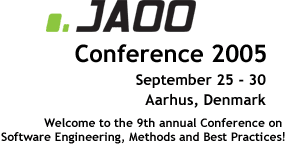JAOO Conference: The Roots of Scrum - DVD available
 Recently I presented at the JAOO conference in Denmark on the Roots of Scrum along with a Scrum Quickstart Tutorial. This was a great conference with about 900 Java and .NET developers in attendance. A DVD of my presentation will be available shortly from JAOO.
Recently I presented at the JAOO conference in Denmark on the Roots of Scrum along with a Scrum Quickstart Tutorial. This was a great conference with about 900 Java and .NET developers in attendance. A DVD of my presentation will be available shortly from JAOO.Many of the speakers were the usual suspects including two signatories of the Agile Manifesto, Martin Fowler and myself.
The attendees were high caliber developers and enthusiastic about Agile methods. Some of them were really pumped up by my talk and when they shared their experiences with me, I was inspired by them! Check out:
The Roots of Scrum: How Japanese Lean Manufacturing Changed Global Software Development Practices
JAOO has produced a DVD containing five video presentations and the associated slides:- Andrew Scotland: Scrum at BBC
- Arvindra Sehmi: Architecting for High Performance, Decentralized, Agent-Oriented Applications
- Frank Cohen: Lessons Learned While Building Scalable SOA
- Jeff Sutherland: The Roots of Scrum: How Japanese Lean Manufacturing Changed Global Software Development Practices
- Martin Fowler: Introduction to DSL
You had to be there to get the full experience and the DVD will provide that experience. Price is 100 EUR and you need to email jaao@jaoo.dk before November 1.





 The Linux Kernel Mailing List (LKML) came alive on Thursday when Linus Torvalds chose to write, in a discussion about the risks of following specs without being flexible enough to take reality into account: "A 'spec' is close to useless. I have _never_ seen a spec that was both big enough to be useful _and_ accurate." The web is currently abuzz with the merits and demerits of this point of view.
The Linux Kernel Mailing List (LKML) came alive on Thursday when Linus Torvalds chose to write, in a discussion about the risks of following specs without being flexible enough to take reality into account: "A 'spec' is close to useless. I have _never_ seen a spec that was both big enough to be useful _and_ accurate." The web is currently abuzz with the merits and demerits of this point of view.